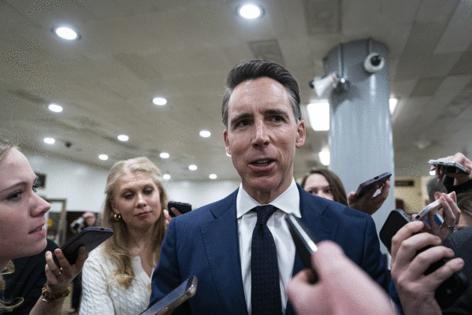Senate GOP mulls shielding rural hospitals from Medicaid cuts
Published in Political News
WASHINGTON — Senate Republicans say they are looking for ways to safeguard rural hospitals from proposed cuts to a key Medicaid funding method, amid concerns from the powerful hospital lobby and others that the budget reconciliation bill could force many facilities to close.
The draft text that the Senate Finance Committee released this week reduces the ability of states who expanded Medicaid under the 2010 health care law to levy taxes on providers to fund their programs.
Senate Majority Leader John Thune, R-S.D., told reporters Wednesday he is working on the issue, though he did not offer details. Leadership is attempting to balance directives to cut government spending with demands from senators like Josh Hawley, R-Mo., who said that the bill should protect rural hospitals from the effects of shrinking provider taxes.
“The right thing to do is not defund rural hospitals to pay for your pet projects,” Hawley said. “So if you want your pet project in the bill, go find your own money. Don’t defund rural hospitals.”
Medicaid is often one of the top payers for rural facilities.
States can levy taxes on hospitals, nursing homes and other providers to fund their share of Medicaid spending. The Finance Committee’s proposal would cap provider taxes for states that expanded Medicaid at 3.5%, down from the current 6%.
Conservatives have derided federal government matching of the provider taxes as “legalized money laundering,” saying states should instead put up their own money. That would likely mean states have to find money elsewhere or start cutting benefits or provider reimbursement rates.
“The Senate goes beyond the House bill, cutting state directed payments and provider taxes, which would dramatically increase the financial burden on states and likely result in cuts to essential benefits and damage to the broader health care ecosystem,” Craig Kennedy, CEO of Medicaid Health Plans of America, said in a statement.
Rainy-day fund
Sen. Rick Scott, R-Fla., floated a two-tier solution that would decrease the federal government’s share of spending on the Medicaid expansion population and establish a rainy-day fund for some hospitals. The Centers for Medicare and Medicaid Services could tap into the fund at its discretion to bolster rural, teaching and other vulnerable hospitals.
Scott said the federal match for Medicaid expansion enrollees could be phased down over two years, after which states would get the same match rate as traditional Medicaid states for new expansion enrollees. The federal government pays about 90% of the costs for Medicaid expansion, and a minimum of 50% of the costs for traditional enrollees, though the percentage varies by state.
But proposals to decrease the federal match have faced fierce opposition from the hospital lobby, which also doesn’t like the proposed changes to the provider taxes. Moderate Republicans bucked any proposed changes to the federal government’s Medicaid expansion match, which was a large part of the reason it wasn’t included in the bill that passed the House last month.
“It’s got to be addressed and hopefully through this process we’ll address it in a rational way,” said Sen. John Kennedy, R-La., who met with Louisiana hospital representatives Wednesday.
“They’re in the learning process right now,” he said. “They don’t completely understand the bill. I’m going through it. I think I have a better understanding than they do.”
Twelve state hospital associations from states that expanded Medicaid, including those representing Missouri and West Virginia, on Wednesday pressed congressional leadership on the proposals in a letter. The groups are concerned that the provider tax proposal in the Finance text could stress hospitals’ finances so much that they have to shut down service lines or close altogether.
“The proposed Senate changes threaten to destabilize health care in communities throughout our states,” the groups said. “The severe funding reductions proposed by the Senate Finance Committee would harm beneficiaries, threaten the viability of struggling hospitals across the nation, and cripple state budgets. It will result in the closure of beds, services and numerous hospitals, particularly in rural America.”
GOP Sens. Shelley Moore Capito and Jim Justice of West Virginia acknowledged rural hospital concerns in comments to reporters Wednesday.
“We’re talking to them. Obviously they’re concerned about the provider taxes,” Capito said.
---------
—Lia DeGroot contributed to this report.
©2025 CQ-Roll Call, Inc., All Rights Reserved. Visit cqrollcall.com. Distributed by Tribune Content Agency, LLC.

























































Comments